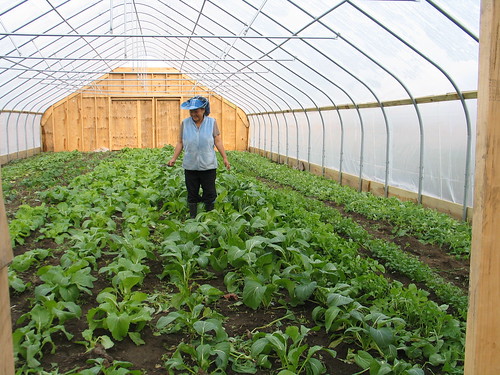
The near-record snowfall in Massachusetts this winter did not deter farmer Pa Thao. In fact, it strengthened his resolve to make sure that nothing happened to the high tunnel that he put up last fall, so that it would be there when he’s ready to plant mustard greens and pea tendrils in the early spring. Every day Thao, who is from Laos, in tropical Southeast Asia, trudged across the frozen field with a shovel to clear snow away from the structure.
Thao and seven other Hmong farmers are protecting natural resources while extending the growing season for the produce they raise at Flats Mentor Farm in Lancaster, Mass. Thanks to funding and technical assistance from USDA’s Natural Resources Conservation Service (NRCS), seasonal high tunnels have been installed on the farm.
A seasonal high tunnel is a greenhouse-like structure, which creates more favorable growing conditions for vegetable and other specialty crops grown in the soil beneath.
Earlier this year, NRCS announced a three-year high tunnel pilot project to help farmers increase the availability of locally grown produce. The project will also evaluate the conservation benefits of high tunnels, such as reducing pesticide use, keeping vital nutrients in the soil and conserving water. Massachusetts is one of 43 states participating in the project, part of the USDA’s “Know Your Farmer, Know Your Food” initiative. Funding is provided through NRCS’ Environmental Quality Incentives Program (EQIP).

District Conservationist Walter Albarran, of the NRCS field office in Holden, Mass., helped several of the growers navigate the application process for the project by calling on the language skills of NRCS Rhode Island State Conservationist Phoukham Vongkhamdy, who was born in Laos.
The 70-acre Flats Mentor Farm provides small farmers of diverse ethnic backgrounds with the land and marketing assistance needed for successful and sustainable farming enterprises. Project director Maria Moreira owns the land and serves as a mentor to the new immigrant farmers from Vietnam, Cambodia, Laos and other countries who lease plots of her land.
Eight Hmong farmers qualified for high tunnels, which started going up on the farm last September. The growers were able to grow and sell crops until Thanksgiving, while most Bay State farmers are done for the season by Halloween.
Over the winter, the farmers brokered a deal with local buyers for a national natural foods retailer. Together they determined what products would sell the best locally. As soon as the ground is warm enough, the growers will start planting bok choy and other cool weather Asian crops that hopefully will be in the market by late April.
Later in the season, Thao and his colleagues will grow warm season crops that they’ll sell at urban farmers markets near Asian communities.
Read more about Know Your Farmer, Know Your Food and the seasonal high tunnel pilot project
Check out more conservation stories on the USDA blog



